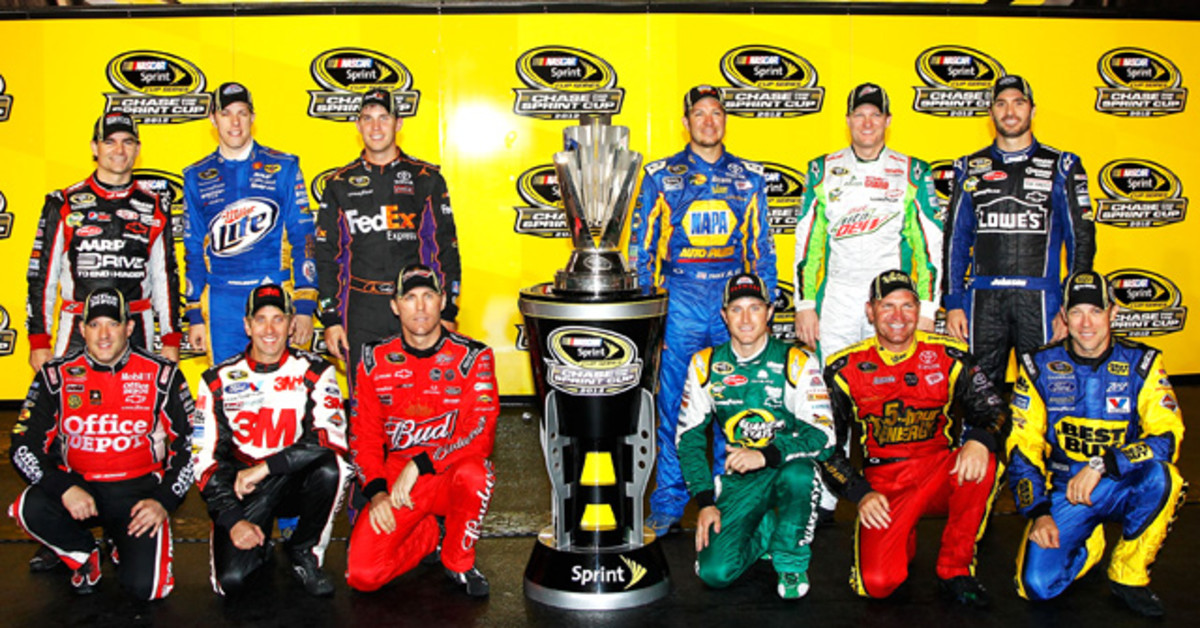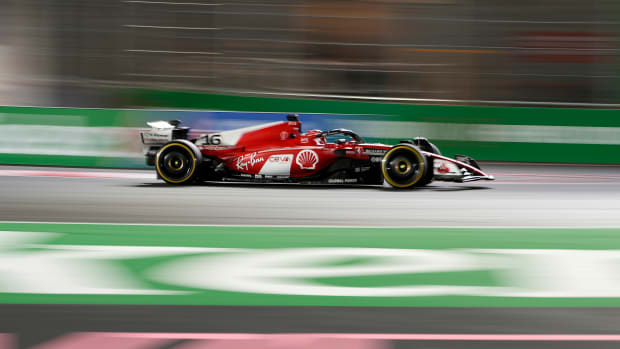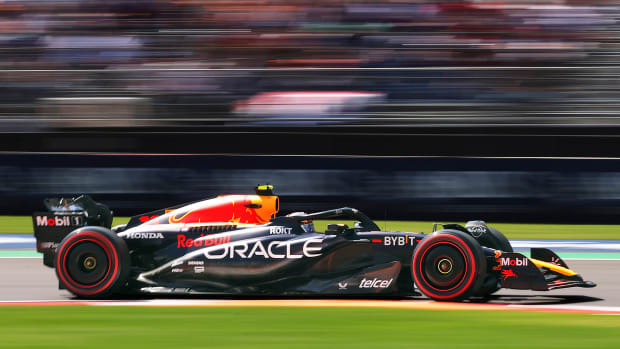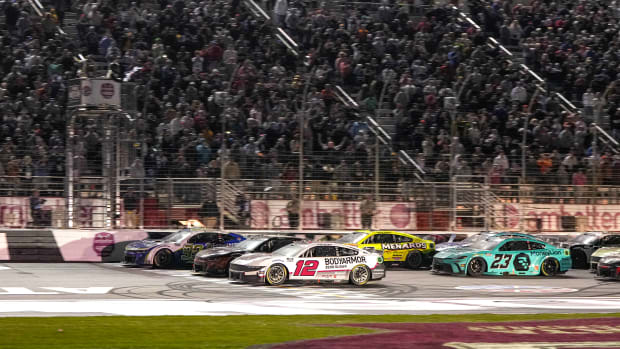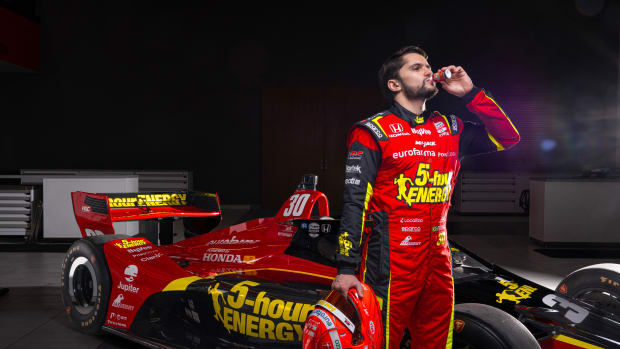NASCAR's Chase has flaws, but has become cornerstone of the season

The 12 drivers who qualified for NASCAR's Chase in 2012 pose with the Sprint Cup trophy.
Todd Warshaw/Getty Images
It took Brian France only four months as NASCAR's Chairman to radically alter what his family had spent more than 50 years nurturing.
He made the ultimate decision that the champion in NASCAR's top series would no longer be determined by season-long performance, as it was when his father and grandfather presided. Instead the season's final 10 races, called the Chase for the Championship, would determine the champion.
"Our goal is to create more interest in the sport,'' France said, when announcing the change in Jan. 2004. "Our goal is to make racing better. Our goal is to get more drivers a championship. This plan is going to do this.''
As the Sprint Cup Series prepares to enter its 10th season with the (renamed) Chase for the Sprint Cup, the question is: did this format of a NASCAR playoff achieve those goals?
First off, the TV ratings indicate that the Chase has not consistently generated more fan interest. The NFL's dominance and a fragmented viewing audience have negatively affected the Chase's TV ratings. However even if the ratings were better, it's questionable if NASCAR would have kept the old championship format. Under the old points system, it was easier for a driver to build a large lead, leaving no drama late in the year.
France has said that dramatic storylines, like Tony Stewart's duel with Carl Edwards in the 2011 Chase, are important to drawing larger audiences. But sometimes even when the storylines are there, the Chase isn't as alluring. Last season's Chase, with the Jeff Gordon and Clint Bowyer feud and a charismatic Brad Keselowski ultimately winning the title, just didn't bring it.
ANDERSON: Should NASCAR race on Monday nights?
Another point of concern is the length of NASCAR's Chase. While 10 races makes consistency a key to a championship, the Chase lasts two-and-a-half months -- longer than the most recent NHL playoffs (two months), NBA playoffs (almost two months), NFL playoffs (nearly a month) and MLB's playoffs (just more than three weeks).
A long Chase takes away the fans' sense of urgency to view every race from the start in fear of missing crucial action. When fans realize that they didn't miss anything by not watching an earlier race, they're more likely to not watch the later races in the Chase.
One of France's greatest hopes with the Chase was having numerous champions; that's been thwarted by Jimmie Johnson and his team, boring many fans with their five-year run of excellence.
Johnson's reign limited the number of different Chase champions to four in the first nine years: Kurt Busch in 2004, Tony Stewart in 2005 and 2011, Johnson 2006-10 and Keselowski in 2012. In the 10 years before the Chase, there were seven different champions.
While it's not the parity France hoped for when he introduced the Chase, he doesn't see it as all bad. He says that drivers and teams regularly up their performance for the Chase, providing has provided some of the desired and unexpected thrills.
"What we're finding out in the Chase, what always happens is that certain drivers -- [Stewart] and [Edwards] did it, [Stewart] to a little higher level -- elevate their game,'' France said a day before Keselowski won last year's title. "If you remember, there was a lot of discussion of 'Well, that really doesn't happen in motorsports and it really can't happen, and everybody is trying as hard as they can and you can do anything you want and that really wouldn't get better performances,' and we now know better than that."
Kurt Busch's title run in 2004 proved dramatic as he avoided calamity several times, including the season finale when a tire fell off as he was headed to pit road. Johnson and Gordon dueled for most of that Chase, but if a fan was anti-Hendrick, then there was little to cheer for. Johnson's battle with Denny Hamlin in 2010 intensified when the crew chiefs became the key story -- Chad Knaus dumping Johnson's pit crew mid-race and a reticent Mike Ford outspoken about Hamlin's chances after Knaus' move.
They served as a warm-up for 2011 when Stewart and Edwards engaged in the best two-man championship race in the Chase; they even played it up the final weeks, parrying in press conferences.
For all that the Chase has or hasn't done, one of its biggest impacts is how it's changed the season. Teams now plan to peak in mid-September when the Chase begins.
"You can't race at the level that you did for the first 26 races and feel like that's good enough to race for a championship,'' said crew chief Paul Wolfe, who guided Keselowski to last year's crown. "I think it's more from a car setup, car [specification] type of thing. You need to be developing things prior to the Chase and know that when you start the first race ... that you know that you're bringing a race car that can compete at a higher level.''
One of the greatest benefits to the Chase is that a team that struggles early in the season isn't all but eliminated from title contention before March ends. Keselowski didn't crack the top 10 in points last year until June, but that didn't derail his title hopes, as it would have in the previous system.
For all that can be attained in the Chase, it can be harsh. Consider Greg Biffle. He won two races before the Chase and led the points after 14 of the first 26 races but a slow start in the Chase doomed his title hopes and he finished fifth in the points. It's easy to look down on his season even though he had his best finish in the points since 2008.
"[The Chase is] extremely stressful for crew guys, crew chiefs, drivers, everybody,'' said Greg Zipadelli, crew chief for Tony Stewart when Stewart won the 2005 Chase.
"You've got a 26-race schedule that is hell and then you've got to race 10 weeks after that and put your best foot forward. If you don't make the Chase, you see everybody switching around, you see sponsorships leaving. That is extremely stressful to add that to your plate when you're used to seeing people together for four, five, six, 10 years, right? Now all of a sudden if something doesn't happen, you're gone.''
As it enters its 10th season, the Chase appears -- flaws and all -- that it will remain for years to come.
GALLERY: Drivers who qualified for the 2012 Chase
